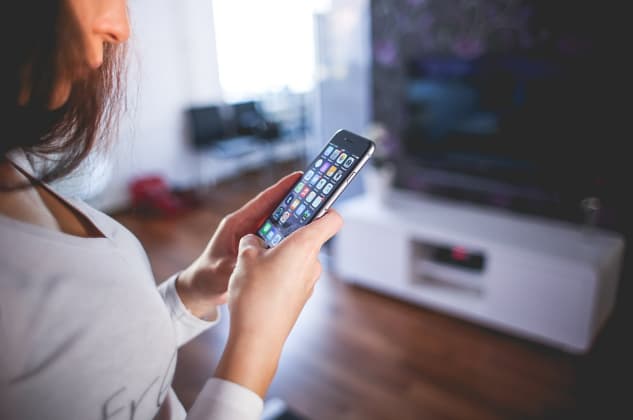- Home
- Family Legacy Documentary
- The Best Phones for Filmmaking and Photography
The Best Phones for Filmmaking and Photography
Explore the best phones for filmmaking and photography in our detailed guide. If you're passionate about photography or filmmaking and are searching for the perfect smartphone camera, your search ends here! Our article delves into the leading smartphones that excel in capturing breathtaking photos and videos. You can achieve professional-quality footage without lugging around a heavy camera, thanks to cutting-edge smartphone technology.
First on our list is the Google Pixel 7 Pro, which boasts an impressive camera setup that captures stunning photos and videos. Its 50-megapixel primary sensor and 12-megapixel ultra-wide lens allow you to capture detailed shots with vibrant colors. The phone's Night Sight mode lets you take amazing low-light shots without grain or blur.
Next up is the Samsung Galaxy S23 Ultra, known for its exceptional camera capabilities. The phone features a 108-megapixel primary sensor, which captures highly-detailed photos even in low-light conditions. The phone's 8K video recording capability makes it an excellent choice for filmmakers. With its advanced autofocus system and image stabilization technology, you can capture smooth and stable footage.
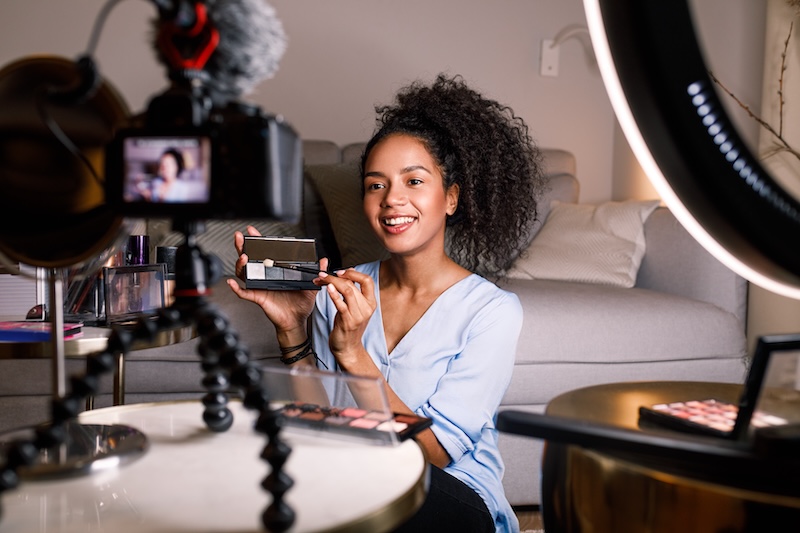
Understanding the Basics of the Best Smartphones
If you're interested in smartphone photography and filmmaking, it's essential to understand the basics of smartphone cameras. In this section, we'll cover the essential components of smartphone cameras, including camera sensors, lenses, optical zoom, digital zoom, and image stabilization.
Camera Sensors
The camera sensor is the most crucial component of a smartphone camera. It captures the light that passes through the lens and converts it into an image. The camera sensor's size and quality determine the image's quality. A larger sensor can capture more light and produce better photos in low-light conditions.
Lenses
Smartphone cameras typically have several lenses, including an ultra-wide, telephoto, and primary lens. The primary lens is the standard lens that captures most images. The ultra-wide lens captures a wider field of view, while the telephoto lens allows for zooming in on distant subjects. Some smartphones also have a macro lens for close-up shots.
Optical Zoom and Digital Zoom
Optical zoom uses the camera's lenses to zoom in on a subject, while digital zoom crops and enlarges the image. Optical zoom produces better-quality images as it doesn't reduce the resolution. Digital zoom can result in pixelated images.
Image Stabilization
Image stabilization helps reduce camera shake and produces sharper images. Optical image stabilization uses the camera's lenses to stabilize the image, while electronic image stabilization uses software to reduce camera shake.
Megapixels and Sensor Size
Megapixels refer to the number of pixels in an image. The higher the number of megapixels, the larger the image size. However, more megapixels sometimes mean better image quality. Sensor size is more crucial than megapixels in determining image quality. A larger sensor can capture more light and produce better images in low-light conditions.
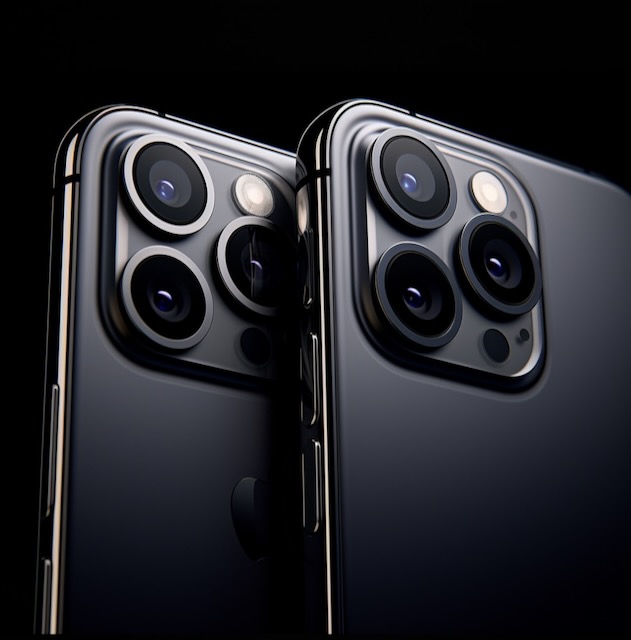 The new iPhone has multiple camera lens
The new iPhone has multiple camera lensMultiple Lenses
Some smartphones have multiple lenses, including a primary and front camera. The rear cameras can have multiple lenses for different purposes, such as an ultra-wide or telephoto lens. The front camera is typically used for selfies and video calls.
Understanding the basics of smartphone cameras is crucial for getting the most out of your camera. By knowing the different components of a smartphone camera, you can make informed decisions when purchasing a new smartphone or taking photos and videos with your current device.
Top Picks for Best Phones for Filmmaking
When it comes to smartphone photography and filmmaking, having a good camera is essential. Here are our top picks for the ideal choice for the best camera phones available in 2023:
1. iPhone 14 Pro and iPhone 14 Pro Max
The iPhone 14 Pro and iPhone 14 Pro Max are two of the best camera phones on the market. They feature a triple-lens camera system with 12-megapixel ultra-wide, comprehensive, and telephoto lenses. The cameras also have improved Night mode and Deep Fusion technology for better low-light performance. The Pro models also come with ProRAW and ProRes video recording capabilities, making them an excellent choice for filmmakers. The iPhone 15 Pro and Pro Max were just released in September 2023, and like all Apple products, something new and improved has been added. Stay tuned!
2. Google Pixel 7 and Google Pixel 7 Pro
The Google Pixel 7 and Google Pixel 7 Pro are two of the best Android camera phones available. They feature a dual-lens camera system with a 50-megapixel primary sensor and a 12-megapixel ultra-wide lens. The cameras also have improved Night Sight and HDR+ technology for better low-light performance. The Pixel 7 Pro also has a 4K video recording capability, making it a great choice for filmmakers.
3. Samsung Galaxy S23 Ultra and Samsung Galaxy S23
The Samsung Galaxy S23 Ultra and Samsung Galaxy S23 are two of the best camera phones for photography and filmmaking. They feature a quad-lens camera system with a 108-megapixel primary sensor, a 12-megapixel ultra-wide lens, a 10-megapixel periscope zoom lens, and a 10-megapixel telephoto lens. The cameras also have improved their low-light conditions features with Night mode and Pro Video mode for better low-light performance and video recording capabilities.
4. Google Pixel 6a and Google Pixel 6 Pro
The Google Pixel 6a and Google Pixel 6 Pro are the best budget camera phones. They feature a dual-lens camera system with a 50-megapixel primary sensor and a 12-megapixel ultra-wide lens. The cameras also have improved Night Sight and HDR+ technology for better low-light performance. The Pixel 6 Pro also has a 4K video recording capability, making it a great choice for filmmakers.
5. OnePlus 10 Pro
The OnePlus 10 Pro is another great camera phone for photography and filmmaking. It features a quad-lens camera system with a 108-megapixel primary sensor, a 50-megapixel ultra-wide lens, an 8-megapixel periscope zoom lens, and a 2-megapixel monochrome lens. The camera also has improved Night mode and Pro Video mode for better low-light performance and video recording capabilities.
These are some of the best camera phones available for photography and filmmaking. Whether you're a professional or just starting out, these phones will help you easily capture stunning photos and videos.
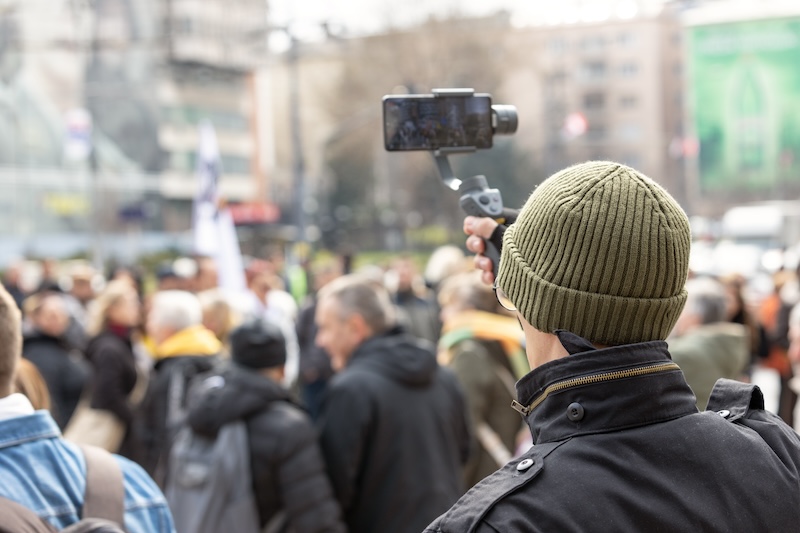 A professional camera is at your fingertips.
A professional camera is at your fingertips.The Best Phones for Filmmaking and Photography
Regarding smartphone cameras, photography capabilities are the most crucial aspect to consider. With the advancement of technology, smartphone cameras have become more powerful and capable of capturing stunning photos.
The best camera phone offers a wide range of features and settings that allow you to take professional-quality photos. You can capture great shots in different lighting conditions, including low-light and night photography, with the correct settings.
Most smartphones now come with a pro mode, which allows you to adjust settings such as ISO, shutter speed, and white balance. This feature is handy for those who want more control over their photos and create unique content.
In addition to pro mode, smartphone cameras also come with various filters that can be applied to your photos. These filters instantly enhance your photos and give them a unique look and feel.
Another vital aspect of smartphone photography is camera performance. The best smartphone cameras have a fast autofocus system, which allows you to capture sharp and clear photos. They also have a real-tone flash, ensuring your photos have accurate colors and lighting.
Many smartphones now have a dedicated macro mode for those who love macro photography. This feature lets you take close-up photos of small objects and capture intricate details.
Smartphone cameras have come a long way in recent years and offer many features that can help you take stunning photos. Whether you're a professional photographer or someone who loves to take photos, a smartphone camera can be a powerful tool for content creation.
Filmmaking Potential
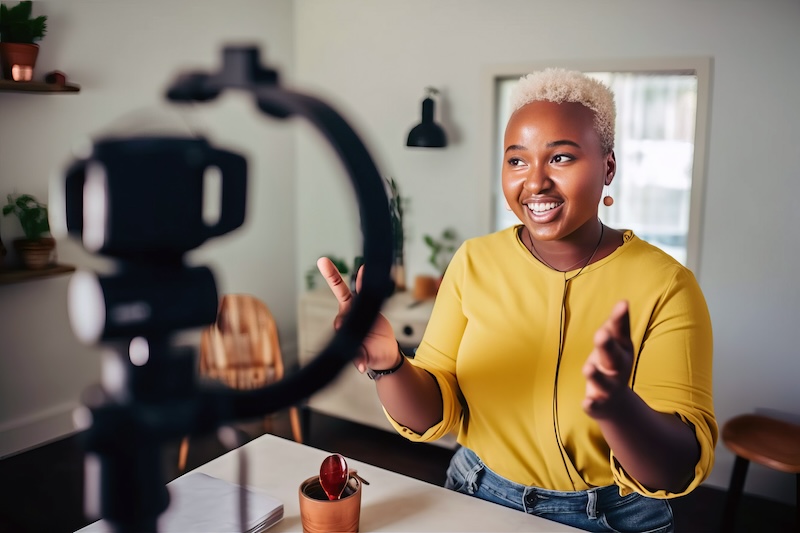 The best smartphone camera for filmmaking offers high-quality video quality recording, Dolby Vision, stabilization, and creative control
The best smartphone camera for filmmaking offers high-quality video quality recording, Dolby Vision, stabilization, and creative controlIf you're a content creator looking for a mobile phone that can handle photography and filmmaking, you'll want to focus on a few special features. First and foremost, you'll want a camera that can record high-quality video. Look for a smartphone that can shoot in at least 4K resolution so your footage looks sharp and detailed.
Another essential feature to consider is Dolby Vision. This technology helps your videos look their best by optimizing color, brightness, and contrast. With Dolby Vision, your videos will be more vibrant and dynamic, making them stand out.
When it comes to video recording, stabilization is crucial. You want your footage to be smooth and precise, as it can be distracting and take away from the overall quality of your video. You can just look for a smartphone with built-in stabilization or invest in a gimbal or stabilizer to keep your shots steady.
Finally, consider the overall filmmaking potential of the smartphone. Does it have a variety of lenses to choose from so you can get different perspectives and angles? Can you adjust settings like ISO, shutter speed, focal length, and aperture, or have full manual controls to get your desired look? Can your phone camera compete with the quality of DSLR cameras? The more control you have over your camera, the more creative you can be with your filmmaking.
The best smartphone camera for filmmaking offers high-quality video quality recording, Dolby Vision, stabilization, and creative control. With these features, you can capture stunning footage and take your filmmaking to the next level.
Brand Specific Features
Regarding smartphone cameras, different brands offer unique features that set them apart. Here are some brand-specific features to consider when choosing the best smartphone camera for photography and filmmaking:
Apple
Apple's iPhone cameras are known for their excellent image processing capabilities and user-friendly interface. The latest iPhone models have advanced features such as Night mode, Deep Fusion, and ProRAW, allowing you to capture stunning photos even in low-light conditions. Additionally, Apple's A-series chips provide excellent performance, making it easy to edit and process your pictures and videos directly on your phone.
Thanks to Google's advanced image processing algorithms, Google's Pixel phones are renowned for their cameras. The latest Pixel phones have features such as Night Sight, Astrophotography mode, and HDR+ that allow you to capture stunning photos in any lighting condition. Google's Pixel phones also offer unlimited cloud storage for your photos and videos, making it easy to access and share your media from anywhere.
Samsung
Samsung's Galaxy series offers some of the most advanced camera systems. The latest Galaxy phones come with features such as Space Zoom, Director's View, and Single Take that allow you to capture stunning photos and videos with ease. Additionally, Samsung's S Pen will enable you to control your camera remotely, making it easy to take photos and videos from a distance.
OnePlus
OnePlus phones are known for their high-quality cameras and user-friendly interface. The latest OnePlus phones have features such as Nightscape, UltraShot HDR, and Pro mode, allowing you to capture stunning photos and videos in any lighting condition. Additionally, OnePlus phones offer excellent performance, making it easy to edit and process your photos and videos directly on your phone.
Apps
Our go-to app for the iPhone series cameras is Filmic Pro. Filmic Pro sets the industry standard as a top-tier smartphone video camera app, offering unparalleled quality and a user-friendly experience. Designed for everyone from Hollywood filmmakers to YouTube creators, it provides comprehensive manual controls for focus, exposure, frame rate, and more. Filmic Pro gives you the tools to realize your creative vision.
While not a smartphone brand, Adobe's suite of mobile apps offers powerful tools for your short film with tools for editing and processing your photos and videos. Adobe Lightroom and Photoshop Express allow you to edit your photos with advanced features such as selective adjustments, color grading, and noise reduction. Adobe Premiere Rush will also enable you to edit and process your videos directly on your phone, making it easy to create professional-quality content.
Each brand offers unique features catering to different photography and filmmaking needs. Please consider your specific needs and preferences when choosing the best smartphone camera.







